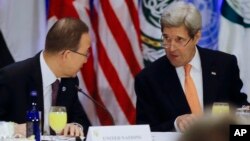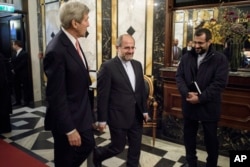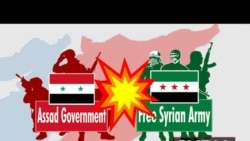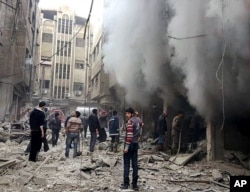Senior officials from 20 nations opened talks in New York Friday on a proposed political transition to end the civil war in Syria, weeks before a plan to launch U.N.-mediated talks between the Syrian government and opposition.
The officials are meeting for a third time to push forward an earlier agreement to implement a cease-fire in Syria so talks on a political transition could begin in the New Year.
Diplomats from the United States, Russia, Iran and other countries that participated in previous rounds of Syria crisis talks were at the table in a New York City hotel Friday.
Supporters of Syrian President Bashar al-Assad -- notably Russia and Iran -- and officials from most of the Western countries that strongly oppose Assad's continued control over the country were also taking part.
“The goal there is to continue to try to better define what we think the political transition and the process itself should look like; to try to put more fidelity on the notion of a cease-fire,” said State Department spokesperson John Kirby.
The so-called International Syria Support Group, or ISSG, also hopes to submit a resolution to be endorsed by the U.N. Security Council. This resolution would endorse the plan for a political transition and a proposed cease-fire.
Officials are also finalizing a list of groups to be considered "terrorist" organizations and excluded from the upcoming peace talks.
Jordanian Foreign Minister Nasser Judeh said his country is coordinating the list, noting he has presented documents submitted from each country of groups they consider terrorist organizations. He said some countries sent "10, 15, 20 names" and others more.
U.S. Secretary of State John Kerry will chair an expected Security Council meeting at U.N. headquarters later Friday, since the United States holds the rotating presidency of the 15-member council this month.
"What is important at this time, as we agreed through Vienna 1 and 2 process [the earlier rounds of talks], it’s important that we should have a nationwide cease-fire as soon as possible,” U.N. Secretary-General Ban Ki-moon said this week during his news conference summarizing the events of the year.
WATCH: Explainer: The Syrian Civil War
Among the goals of the International Syria Support Group is drafting a list of terrorist groups active in Syria – to identify which extremists should not be exempt from attack during a cease-fire – and also to list groups that are willing participants in efforts to open a political dialogue with the Damascus government.
Speaking late Thursday at U.N. headquarters, Iranian Foreign Minister Mohammad Javad Zarif expressed doubt the conference would make much progress on identifying acceptable Syrian opposition groups.
"We haven't seen the list yet, but we believe that card-carrying members of al-Qaida do not satisfy the conditions that we've set for members of the opposition in Vienna," Zarif said.
Zarif's statement reflects one of the key unresolved questions at the talks: whether Iran and Russia will agree to negotiations with many of the Syrian rebel groups they have regularly condemned as terrorists.
Jessica Ashooh, a Middle East expert from the Atlantic Council, told VOA the resolution should adequately resolve two key points: how to describe and identify terrorist groups, and to what extent the 2012 Geneva Communique on Syria is upheld.
The Geneva Communique was considered to be the road map for the Syrian political process, in which a transitional governing body would be formed by mutual consent among all parties involved in the Syrian crisis.
“The Syrian opposition will be getting very nervous if there’s any indication in resolution or discussions on Friday that either the U.S. or Russia are considering leaving the consensus of the Geneva Communique in favor of new language on the Syria process,” Ashooh said.
During a recent visit to Moscow, Kerry said American and Russian negotiators "did reach some common ground ... and agreement with respect to the complexity of this issue of terrorist groups.”
"The talks on Friday and the resolution that may or may not come out of the talks on Friday really will set the stage for whether or not the Syrian conflict is resolved in a quick manner or whether it remains drawn out," Ashooh said.
Mike Richman in Washington, Margaret Besheer at the United Nations and Nike Ching at the State Department contributed to this report.









